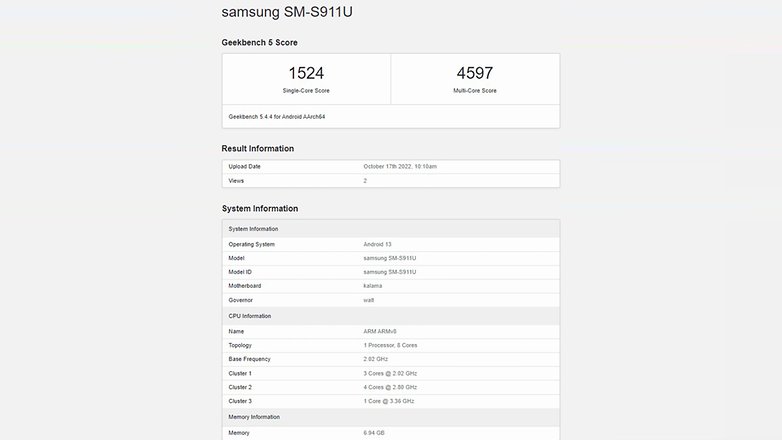
Qualcomm’s upcoming Snapdragon 8 Gen 2 has been spotted powering the unannounced Galaxy S23. The preliminary benchmark results show drastic improvements from this year’s Gen 1 processor. However, the early numbers also suggest that Samsung’s Galaxy S23 will lag compared to the iPhone 14 Pro (Max) and even from the iPhone 13 Pro in speed.
TL;DR
- Samsung’s Galaxy S23 with Snapdragon 8 Gen 2 first benchmark leaked.
- The Galaxy S23 could offer significant improvements over the Galaxy S22.
- Last year’s iPhone 13 Pro still got higher scores than the unannounced Galaxy S23.
The benchmark results were uncovered by Galaxy Club from Geekbench’s database. It indicates that the standard Galaxy S23 for the US market will go with the SM-S911U model name while the “Kalama” codename could refer to the SD 8Gen2 Qualcomm chipset. Furthermore, the eight-core cluster design of the flagship SoC is confirmed with the main core clocking at 3.36GHz.
Much better scores than the Galaxy S22
In terms of numbers, the Samsung Galaxy S23 with the aforementioned chip and 8GB of RAM tips the scale at 1524 points for the single-core and 4597 for the multi-core test. This puts the Galaxy S23’s results significantly higher than the Galaxy S22 with the SD 8Gen1 which has average Geekbench numbers of 1200/3200.

Despite the increase, the Galaxy S23 still lags behind the iPhone 13 Pro (Max) that produces 1700/4700 single-core and multi-core scores, respectively. Putting the Galaxy S23 side-by-side to the iPhone 14 Pro (Max) with the new A16 Bionic chipset further widens the gap, especially in the multi-core section which averages at 5400.
Does having higher benchmark scores matter?
Although these numbers don’t always reflect real-life usage, the higher the score means having a respectable performance in the long run. Likewise, these results may be adjusted on the final production unit of the Galaxy S23, but we’re not expecting a promising change.
Additionally, it is still unclear if Samsung will entirely opt for the Snapdragon 8 Gen 2 chip for the non-US variants. It was speculated earlier that Exynos could be dropped due to many issues like overheating and inefficiency, among others.
Do you think having higher benchmark scores is essential in a flagship smartphone? We’d love to hear your thoughts in the comment section.